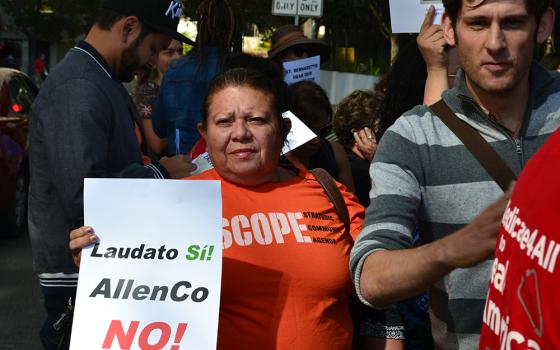Sr. Michaela Rak of the Sisters of Merciful Jesus hugs a patient in the Hospice of Blessed Michal Sopocko in an undated photo in Vilnius, Lithuania. (OSV News/Courtesy of the Hospice of Blessed Michal Sopocko)
When Sr. Michaela Rak opened the first hospice in Lithuania in 2009, she didn't know she would open a whole new world for palliative care patients in this European country that used to be part of the Soviet bloc.
"Dying is a very intimate part of life. And many times, I heard people say: 'Just be with me at that moment,' " Rak told OSV News.
She never planned to be a director of Blessed Father Michal Sopocko Vilnius Hospice. For years, she had a wedding dress in her closet and an engagement ring on her finger.
"I was very open to my fiancé that I feel I want to be a nun, and still I accepted his engagement," she said.
She was struggling with the life choices to be made and decided to search for answers in the Holy Land. She stood by the Bethesda pool in Jerusalem, opened the Scripture and read about a sick man who tells Jesus that he had no one to help him get into the pool to be cured: "I have no one to put me into the pool when the water is stirred up; while I am on my way, someone else get down there before me" (John 5:2-7).
"This short statement, 'I have no one to put me,' was for me the voice of God for which I had been waiting for for so long. So many people in their lives need another person to lead them into the pool of their life where they will be healed and strengthened," Rak told OSV News. "I understood right there in Bethesda where my place is."
She committed her life to the Congregation of the Sisters of Merciful Jesus. After serving for 12 years in the St. Camillus Hospice in Gorzow Wielkopolski in Poland, in 2008, she accepted the proposal of Cardinal Audrys Backis, archbishop of Vilnius at the time, to build a first-ever hospice in the country.
Vilnius is a city where St. Faustina Kowalska — who received visions from Jesus, including one of Jesus wearing a white garment with beams of red and white coming from his heart, which came to be known as the image of Divine Mercy — met the patron of the hospice, Fr. Michal Sopocko. The priest became St. Faustina's confessor and spiritual director. He helped Kowalska commission an artist to paint the first Divine Mercy image based on her vision of Jesus.
Divine Mercy Sunday is celebrated every year on the Sunday after Easter, which this year is April 16. It was added to the universal church calendar by St. John Paul II in 2000. The Polish pope was a longtime devotee of the Divine Mercy devotions of St. Faustina.
Rak arrived at the city of mercy with a few coins in her pocket. "I placed those coins next to the tabernacle in our convent, and, as usual, I was pretty blunt with Jesus. I told him, 'Jesus, here, you have a dollar. Let's build a hospice out of it.' "
Today, the hospice is a vibrant medical entity, and Pope Francis greeted its patients during his apostolic trip to Lithuania in September 2018.
"You can say that illness, suffering, pain, death is something dramatic, and what I experience here is that these moments have become a victory," Rak told OSV News. Thousands of patients have been "walked" on the other side thanks to the hospice.
Advertisement
Even if death is an everyday companion, Rak keeps her spirit.
"Death is not the end," she said. "When a mom or a dad is passing away, I keep telling their loved ones, 'Mom is alive, Dad is alive, they only changed the address."
"The word 'death' is like a sharp knife," she said, adding that she usually tries to find other wording so she doesn't hurt the patient's families.
"I'm not afraid of death. It's part of life," she said. The "cheerful nun" is famous around the Lithuanian capital for driving her minivan to get supplies for her hospice.
"The biggest mistake we make is that we don't talk about death," Rak told OSV News. "Grandma or Grandpa pass away, and the grandchildren sometimes don't know about it. It's wrong," she said, adding that we can't escape death, but we can be ready for it.
"Truth is liberating. Even if it's hard and painful, it shapes the right attitudes" for patients and their families.
In the hospice, death is not a taboo subject.
"When we have a frank conversation with a sick person about his or her condition, the question is always asked: 'Will I die?' Yes, everyone will die someday, but now, you have time to do many more things," Rak tells her patients. "It is an encouragement for a person to put their affairs in order, to leave this world with the knowledge that they have done everything that could be done here on Earth."
"Closure of earthly businesses and forgiveness is what brings a needed 'breath,' " Rak said, stressing that easing the physical pain of a patient is as much needed for them to go to the other side without suffering.
"No one is left alone in their last moments; they feel our touch, hear our words. We give them medication. For every question of a dying person, we give a true and exhaustive answer," she said. "Because when a person dies, there is no room for falsehood, and even the smallest lie can be exposed very quickly."
In February 2020, Rak opened a new branch of the hospice for children. But it was one patient from the adult hospice she carries deeply in her heart.
"My former fiancé heard that our hospice is renowned for its good care, and he brought his dying wife here," Rak told OSV News. "God so happened that when she was passing to eternity, I was there with her, I was literally holding her body. She was dying in my arms."
"This sense of peace, fulfillment and being a person who gives him or herself at that moment showed me in a powerful way what a great gift it is when a person is able to respond to God's call," Rak said.
For her, closeness and sincerity are key to take away fear. That's when peace, a smile and good tears arrive.
"Don't put off saying [to] someone, 'I love you,' until tomorrow. Just say it today," she said.
The hospice is located in the land "where St. Faustina and Blessed Father Michal Sopocko physically walked on," Rak said. The hospice building, where the patients' rooms are located, stands right next to the building where the painting with the caption "Jesus, I Trust in You" was painted.
Finally, Rak said Jesus said he wants to be known by the good deeds of those who show his mercy and love to others.
"From this place, mercy went out into the world," she said. "In the hospice building, in every room, there is a picture of merciful Jesus, and our patients are accompanied by the words: 'Jesus, I Trust in You.' "






